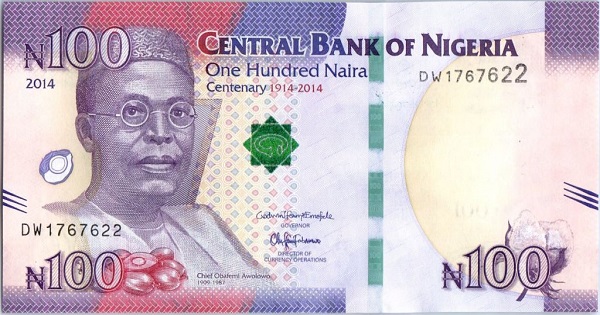E-Financial
How and Why Obafemi Awolowo Coined the Term Naira

Chief Obafemi Awolowo coined the term Naira- Nigeria’s currency when he was the Federal Commissioner for Finance between 1967 and 1971, according to Tokunbo Awolowo, the daughter of the late age.
Tokunbo Awolowo said her father collapsed the name of the country and arrive at the term Naira.
”He just took the name of Nigeria and collapsed it to Naira. That’s what he told us and that was how he arrived at the name ‘Naira’ and that was when he was the Federal Commissioner for Finance” she said in an interview with the Punch
 late Chief Obafemi Awolowo
late Chief Obafemi Awolowo
Federal Government of Nigeria introduced the Naira as new money system on Monday, January 1, 1973.
Before then, the official currency was the Nigerian Pounds which was introduced in 1907 while the minor unit of the currency was Shillings.
According to the Central Bank of Nigeria, the decision to change to decimal currency followed the recommendations of the Decimal Currency Committee set up in 1962 which submitted its report in 1964.
Meanwhile, prior to the introduction of the new currency in 1973, Chief Obafemi Awolowo was the Federal Commissioner for Finance between 1967 and 1971.
 Emefiele, CBN gov
Emefiele, CBN gov
And as the Finance Minister, Awolowo took it upon himself to come up with a new name for the new currency as the then Head of State, General Yakubu Gowon had reportedly announced in March 1971, that Nigeria would change to decimal currency on January 1, 1973.
The N100 denomination was introduced in December 1999 bearing the portrait of Chief of Obafemi Awolowo.
However, as of 1973, one Naira was the major currency unit in the country.
Four years after the introduction of Naira, a new banknote denomination of the value of 20 Naira was issued on Friday, February 11, 1977, and as a result, N20 became the first Nigerian currency bearing the portrait of a Nigerian citizen, General Murtala Ramat Muhammad.
Interestingly, 26 years after Naira became the official currency of the Federal Republic of Nigeria, another denomination of the value of N100 was introduced with the portrait of Chief Obafemi Awolowo precisely in December 1999.
And in a bid to facilitate an efficient payment system, the Central Bank of Nigeria introduced N200, N500 and N1000 notes in November 2000, April 2001 and October 2005 respectively.
E-Financial
Africa Launches PAPSSCARD, First Pan-African Card Scheme

Africa has marked a significant step towards financial independence following the launch of PAPSSCARD, the continent’s first Pan-African card scheme.

Professor Benedict Oramah, president and chairman of the Board of Directors, Afreximbank,
Unveiled on June 27 at the 32nd Afreximbank Annual Meetings in Abuja, Nigeria, the new card represents a major leap in Africa’s efforts to achieve financial sovereignty by building resilient and independent payment systems, easing people travel and boosting trade integration.
PAPSSCARD, a joint-venture between the African Export-Import Bank (Afreximbank), the Pan-African Payment and Settlement System (PAPSS) and Mercury Payment Services (MPS), enables fast, secure, and affordable retail payments across African borders. Currently, most African card payments are routed through global systems causing increased fees and loss of data control. By processing transactions entirely within the continent, PAPSSCARD keeps value, data, and economic benefit in Africa.
Speaking at the launch, Professor Benedict Oramah, president and chairman of the Board of Directors, Afreximbank, highlighted the significance of PAPSSCARD in reclaiming Africa’s financial autonomy.
“For too long, Africa’s reliance on external payment systems has impeded trade, increased costs, and compromised control over our financial data. PAPSSCARD changes that. It empowers us to move money swiftly, securely, and affordably across our borders. It is a transformative step towards strengthening intra-African trade and preserving value within the continent.”
Mike Ogbalu III, CEO of PAPSS, described PAPSSCARD as a major advancement in the continent’s financial architecture, noting that it is “more than just a payment tool, it is a powerful symbol of progress and a bold step towards financial independence.” He added that the card reflects Africa’s ability to create practical, home-grown solutions that align with how the continent trades, lives, and grows.
Muzaffer Khokhar, executive chairman, Mercury, said the launch represents a milestone in Africa’s move toward financial sovereignty.
“We are proud to support a system built by Africa, for Africa. This is about sovereignty, innovation, and building trust in African systems to shape the continent’s financial future. The PAPSS Card will become Africa’s most trusted payments brand, strengthening the backbone of the continent’s financial future.”
John Bosco Sebabi, acting CEO of PAPSSCARD, added that the new payment offering will unlock benefits for a wide range of stakeholders, from corporates and banks to merchants and individuals.
He said that the PAPSSCARD card would “reduce costs for public institutions, support innovation across the financial sector, and expand access to secure, modern payment tools for people and businesses across the continent.”
Commemorative cards were unveiled at the 32nd Afreximbank Annual Meetings to mark the launch of the PAPSSCARD.
This initiative was made possible by strategic partnerships with issuing banks – Bank of Kigali and I&M Bank Rwanda; Rswitch, Rwanda’s national switch – Smart Cash; and Unified Payments, ensuring its seamless acceptance throughout Nigeria.
African central banks and payment systems are set to spearhead the continent-wide adoption and rollout of the new PAPSSCARD.
This initiative will significantly advance Afreximbank’s strategy to promote financial inclusion and boost intra-African trade under the African Continental Free Trade Area (AfCFTA), fostering a more integrated and self-sustaining African economy.
E-Financial
UBA Expands to More African Cities, Stamps Footprint in Saudi Arabia

United Bank for Africa (UBA) has announced strategic expansion into more African countries even as it plans to open a new office in Saudi Arabia, marking a significant milestone in its mission to connect Africa with key global markets.

Oliver Alawuba, GMD/CEO, UBA group,
This emerged during the Group’s Half Year Business Review held at its global headquarters in Lagos, where Oliver Alawuba, group managing director/CEO, UBA group, met with senior executives overseeing UBA’s 24-country footprint.
The meeting reaffirmed the bank’s pan-African strategy while outlining bold new steps into global markets.
Alawuba highlighted UBA’s continued growth outside Nigeria, with more than 51.7% of Group revenues now generated from its ex-Nigerian operations.
He described the Saudi expansion as a move that positions UBA to support cross-border trade, attract investment flows, and better serve the African diaspora.
“UBA’s vision is clear—we are building a truly global institution anchored in Africa, but serving customers across continents. Our entry into Saudi Arabia signals confidence in new opportunities and commitment to supporting economic connectivity between Africa and the Middle East,” he said.
The Saudi expansion adds to UBA’s international presence, which currently includes the United Kingdom, United States, France, and the United Arab Emirates. Alawuba also disclosed that the bank is upgrading its operating licence in France to further strengthen its European operations.
“In Europe, UBA has operations in the United Kingdom and is upgrading its licence in France, expanding its capacity to serve cross-border trade, investment flows, and the African diaspora, complementing our over 40-year presence in New York,” Alawuba noted.
Since launching its pan-African journey with an entry into Ghana in 2004, UBA has expanded rapidly across 20 African countries, establishing itself as a leading driver of financial inclusion, innovation, and regional integration.
E-Financial
Ecobank Plans to Raise $250m Capital Through Private Placement

Ecobank Transnational Incorporated announced its plan to raise up to $250m in Additional Tier 1 capital through a private placement of contingent convertible notes.

In a statement filed on the Nigerian Exchange Limited recently, the capital raise was approved by shareholders at the company’s Extraordinary General Meeting held in Lomé, Togo. The private placement offer was launched on July 9 and will run for ten days.
“Following the approval of the shareholders at its Extraordinary General Meeting held on May 28, 2025, in Lomé, Togo, to raise up to $250m in additional Tier 1 capital qualifying instruments via a private placement of contingent convertible notes, Ecobank Transnational Incorporated announces the launch of the AT1 effective July 9, 2025, for ten days. Renaissance Capital Africa has been appointed as the transaction adviser to ETI.”
The move is an initiative aimed at strengthening Ecobank’s capital adequacy, enhancing financial resilience, and supporting its long-term growth ambitions across its diversified pan-African banking platform.
Additionally, Madibinet Cisse, Ecobank’s Company Secretary, said, “This proposed capital raise represents a critical step in our efforts to fortify the bank’s financial foundation and support sustainable growth across Africa.”
It would be recalled that Ecobank Transnational Incorporated, the parent company of the Ecobank Group, has raised an additional $125m through a Eurobond tap, bringing the total size of its 2029 notes to $525m.

 Broadcasting1 day ago
Broadcasting1 day agoNigeria Week Ahead: Inflation, Oil and Naira in focus

 News1 day ago
News1 day agoEFCC: Accusations Against Our Chairman Are Baseless and Misleading

 Broadcasting3 hours ago
Broadcasting3 hours agoA Billion-Dollar Obsession in 90-Second Bites

 General News14 minutes ago
General News14 minutes agoWoodhall Capital and Partners Launch ₦1.5Bn Fund

 E-Business13 minutes ago
E-Business13 minutes agoFirm Highlights Top Risks of Quantum Computing

 News13 minutes ago
News13 minutes agoExperts Urge MSMEs to Build Strong Partnerships in Solving Problems,

 General News13 minutes ago
General News13 minutes agoAM Best Reaffirms Stable Outlook for Cyber Insurance Market

 News14 minutes ago
News14 minutes agoFirstBank, NLNG, Shell back QEDNG Creative Powerhouse Summit




















